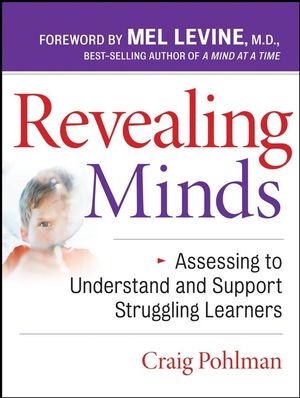Revealing Minds: Assessing to Understand and Support Struggling LearnersISBN: 978-0-7879-8790-9
Paperback
352 pages
August 2007, Jossey-Bass
 |
||||||
Preface.
Acknowledgments.
The Author.
About Revealing Minds.
About All Kinds of Minds.
1 Assessing to Understand.
The Case for Phenomenology.
Profiles as Tools for Understanding Students.
Answering the Question Why? (and Why That Matters).
Identifying Assets (and Why They Matter).
Neurodevelopmental Variation as Normal Variation.
Why the Focus on Assessment.
The Approach of This Book.
My Perspective and Background.
Assessment Is Both Complex and Simple.
2 The Need for a Framework.
The Prepared Mind.
The Pitfalls of Being Atheoretical.
Conceptual Correctness.
Theoretical Frameworks for Understanding Learning.
A Neurodevelopmental Framework.
Other Factors That May Impede Learning.
Selecting a Framework: A Choice for the Professional.
3 The Art of Task-Analysis.
Two Types of Reasoning.
Analysis of Academic Skills.
Analysis of Assessment Tasks.
Constructing Learning Plans.
Task-Analysis as an Assessment Tool.
4 Making Linkages.
Functions Versus Skills.
Linkages.
Why Linkages Matter.
Major Linkages Between Skill Deficits and Neurodevelopmental Functions.
5 Assessing from Multiple Angles.
Assessment and Testing.
Multi-Method Assessment.
Qualitative and Quantitative Findings.
Dynamic and Standardized Techniques.
Limit Testing.
What History Can Reveal.
Assets and Affinities.
The Case for Teamwork.
Assessment as a Process.
Comparing and Contrasting Angles.
6 A Better Use of the Discrepancy Concept.
Clinical Contrasts.
Academic Task to Academic Task.
Neurodevelopmental Task to Neurodevelopmental Task.
Neurodevelopmental Task to Academic Task.
Clinical Branching Logic.
Contrasts in History Reports.
A Tool for Better Understanding.
7 Searching for Recurring Themes.
Making the Case.
Examples of Recurring Themes.
Potential Hazards in the Search for Recurring Themes.
Tactics for Organizing Findings.
Change in Course.
8 Assessing Attention.
The Construct of Attention.
Some Important Distinctions.
General Assessment Considerations.
Tasks Designed to Assess Aspects of Attention.
Task-Analysis for Attention.
Attention Signs and Symptoms.
Secondary Attention Deficits.
9 Assessing Memory.
The Construct of Memory.
Some Important Distinctions.
General Assessment Considerations.
Tasks Designed to Assess Types of Memory.
Task-Analysis for Memory.
Memory Signs and Symptoms.
10 Assessing Language.
The Construct of Language.
Some Important Distinctions.
General Assessment Considerations.
Tasks Designed to Assess Components of Language.
Task-Analysis for Language.
Language Signs and Symptoms.
11 Other Neurodevelopmental Factors to Consider.
Spatial Ordering.
Temporal-Sequential Ordering.
Neuromotor Function.
Conceptualization.
Reasoning and Logic.
Creativity.
Social Cognition.
Cross-Construct Phenomena.
Degree of Context.
Other Factors That Can Affect Learning.
Organization.
Turning the Corner.
12 Telling the Story.
Importance of Demystification.
Guidelines for Written Reports.
Communicating Outside the Box.
13 Understanding to Assess.
Having New Eyes.
Making the Case.
The Virtues of Splitting.
Framing the Work.
Preparing the Mind.
Passionate Curiosity.
Talking the Talk and Walking the Walk.
References.
Glossary of Terms.
Appendix A: Supporting Research for a Neurodevelopmental Framework.
Appendix B: Assessment Task-Analysis Guide.
Appendix C: Index of Potential Findings.
Appendix D: Tests and Batteries for Neurodevelopmental Assessment.
Appendix E: Learning Plan Resources.
Index.



